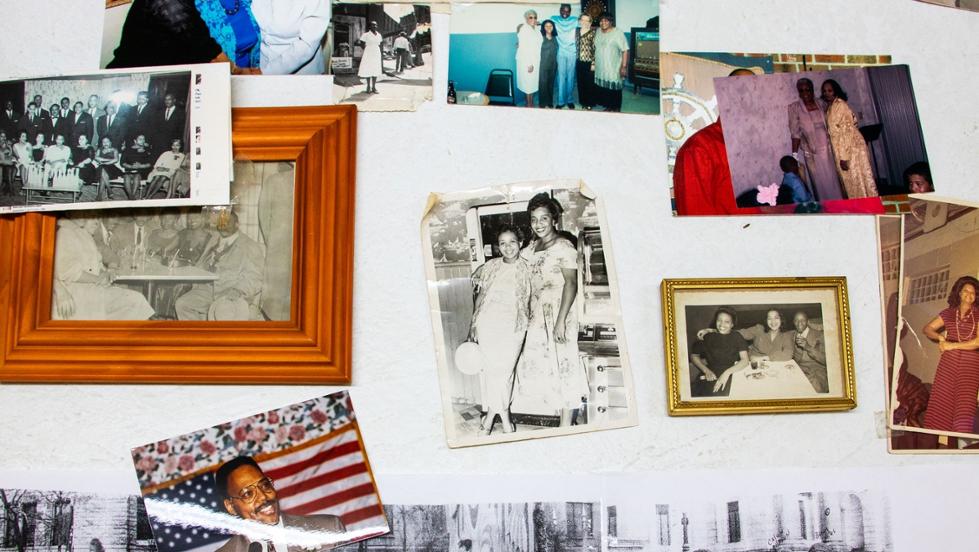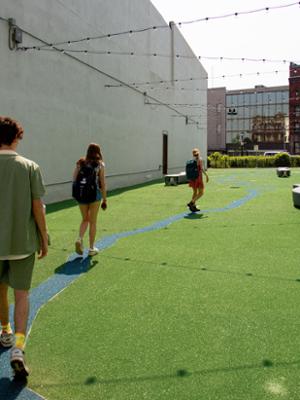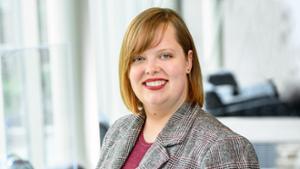
Victoria Holland ’26, Nicholas Kreidler ’28, and Chloe Root ’28 embarked on an investigation of these “third spaces” through the Summer Community Impact Fellowship (SCIF) program this summer, seeking to understand the status and history of recreation and community in Utica, our neighboring city.

The trio focused specifically on available third spaces for Utica’s youth population. “We’re analyzing what they want, what they already have, where they like to go, and trying to get a past, present, and future overview of space in Utica,” Holland said. “Through talking with older adults, we get a vision of the past and through kids, a vision of what is wanted nowadays. With those, we can propose something for the future.”
To truly understand Utica’s spaces, the team immersed themselves in the city. Holland, Kreidler, and Root volunteered at summer camps and local events. They connected with community members at nursing homes and Juneteenth festivities.
“It was really nice to branch out and hear from people who see the city and the space completely differently than I do.”
“It was really nice to branch out and hear from people who see the city and the space completely differently than I do,” Root said. “Older folks, especially, have a totally new perspective from what we normally hear at Hamilton.”
Kreidler recalled, “I have a really powerful memory of asking some kids at summer camp about their dream third space, and one kid said they need a soup kitchen in Cornhill.”
The child’s comment is a poignant example of how third spaces connect to many of the broader challenges urban areas like Utica struggle with today. The team noted that problems such as walkability, affordability, and safety were often brought up by interviewees as barriers to accessing third spaces in Utica. These obstacles impede community-building and the tangible benefits that come from third spaces, like reduced crime and better outcomes in schooling.
“How we design our cities, our spaces, and the places we hang out changes how we interact with each other and that changes how we think of each other,” Kreidler said. “We’re in a crisis of community in America right now. I think, especially in the modern era, it’s really important to connect with people in real ways in real places and to connect with strangers and branch out.”
“We’re in a crisis of community in America right now. I think, especially in the modern era, it’s really important to connect with people in real ways in real places and to connect with strangers and branch out.”
Holland added, “Third spaces occupy a very crucial space in democracy by connecting people and bringing them together, because they are ideally a space that anyone is welcomed in. Without them, you’re separated from people who are different, and you never see them around because everyone is inside a car.
During their conversations with community partners, the trio also inadvertently learned about memory and the importance of adolescence.
“I’ve watched older people recount exactly the things they did in high school, like where they went sledding in freshman year. It has grounded me to think that this time in your life is so important and will stick with you forever,” Root said. “I’ve also learned a lot about what kids remember and how savvy the youth are now. They remember everything their parents are talking about, they know how far away things are, they know what it’s like to experience violence, and they’re so much more brilliant than I remember myself being at their age.”
The team has harnessed Uticans’ stories of its past and present to imagine ways to promote third spaces and stronger communities in the city. They hope their findings will aid community partners such as nonprofits in supporting Utica’s needs and desires.
Posted August 18, 2025


